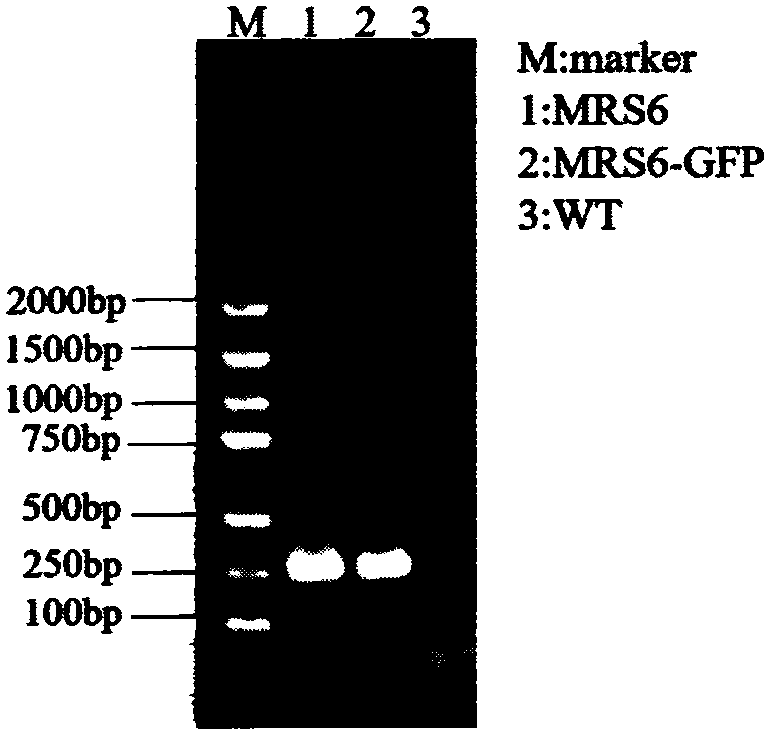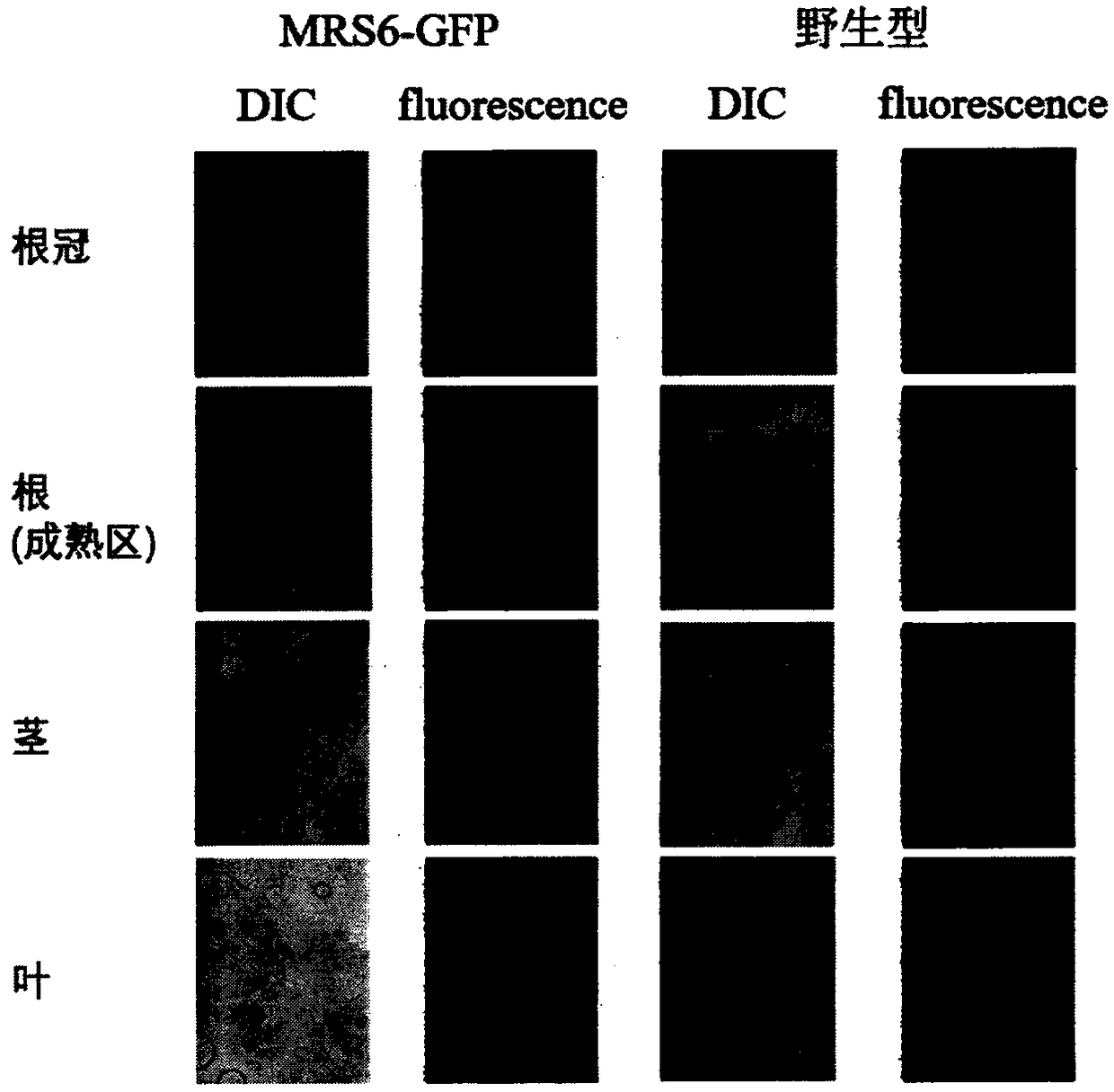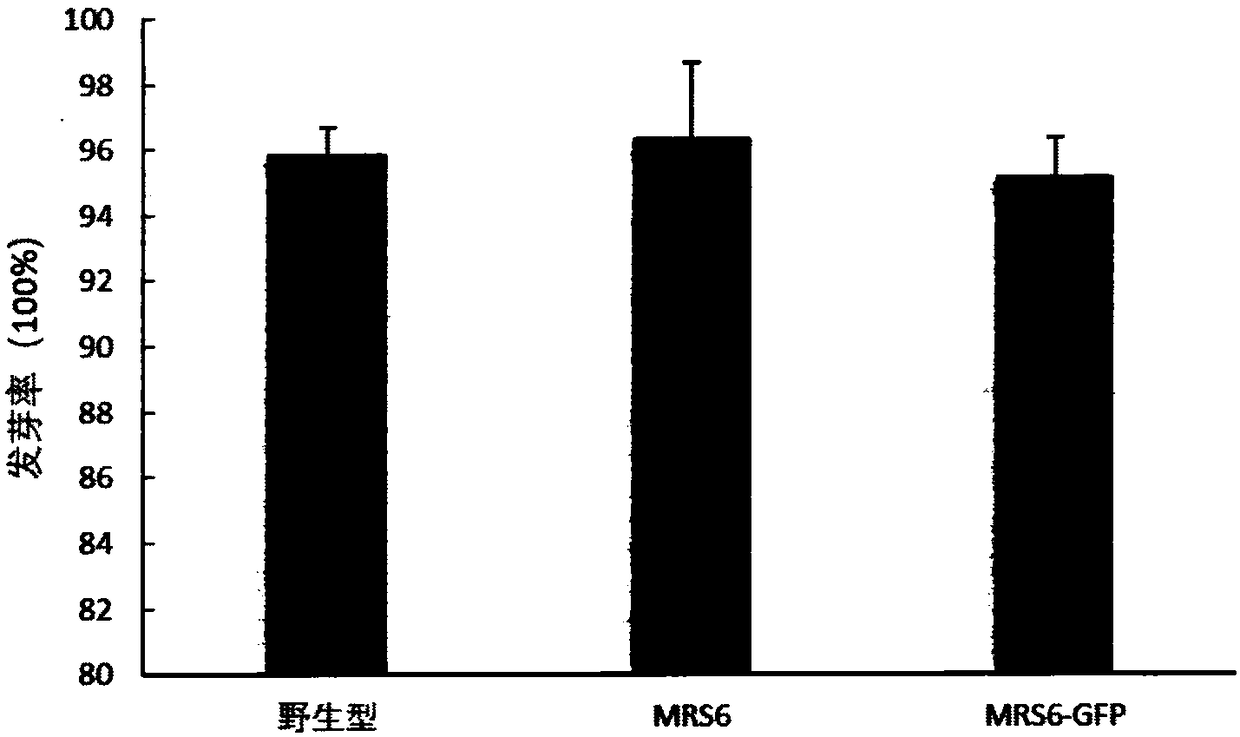Use of gene MRS6 in improvement of tolerance of tobacco to heavy metal cadmium
A heavy metal and gene technology, applied in application, genetic engineering, recombinant DNA technology, etc., can solve problems such as environmental hazards and obvious risks
- Summary
- Abstract
- Description
- Claims
- Application Information
AI Technical Summary
Problems solved by technology
Method used
Image
Examples
Embodiment 1
[0045] Genetic transformation of tobacco and PCR identification of transgenic tobacco.
[0046] (1) PCR amplification of MRS6 gene
[0047] Primers were designed according to the yeast genome database information, with Saccharomyces cerevisiae S288C (PLoS Genet, 2012, 8(11): e1003083) and MRS6-GFP strains (according to Nature, 2003 .425:686-691. Methods The genome was constructed on the basis of S288C as a template, and the PCR amplification of MRS6 and MRS6-GFP genes was carried out. The PCR reaction system (25 μL) was: EmeraldAmp MAX PCR Master Mix (2×Premix) 12.5 μL, and the primers (concentration: 1OD ) 1 μL, lower primer (concentration is 1OD) 1 μL, template DNA (concentration is 233ng / μL) 1 μL, ddH 2 O9.5 μL. The PCR amplification program was as follows: pre-denaturation at 95°C for 3 min, denaturation at 95°C for 30 s, annealing at 55°C for 30 s, extension at 72°C for 100 s, 32 cycles, final extension at 72°C for 10 min, and hold at 4°C. A PCR amplification product i...
Embodiment 2
[0070] Effects of MRS6 and MRS6-GFP overexpression on plant growth.
[0071] (1) Sterilize the wild type and the transgenic Sansheng Tobacco seeds obtained in Example 1, the specific steps are:
[0072] i. put the tobacco seeds into the EP tube under aseptic conditions and rinse 3 times with sterile water;
[0073] ii. Soak in 70% ethanol solution for 1min;
[0074] iii. Then soak in 1% sodium hypochlorite solution for 10 minutes, and then rinse the seeds repeatedly with sterile water for 4 to 5 times;
[0075] iv. Finally, place the rinsed seeds on sterile filter paper to absorb excess water.
[0076] (2) Sow 40 sterilized tobacco seeds on MS solid medium, culture in an artificial climate incubator, and culture in dark for 3 days. The temperature was 28°C, and light and dark (16h / 8h) were alternately cultivated for 45-50 days, during which the plant growth was observed and related data were recorded.
[0077] (3) After the tobacco plants were cultivated for about 5 days, ...
Embodiment 3
[0082] Effects of overexpression of MRS6 and MRS6-GFP on cadmium tolerance and cadmium accumulation in plants.
[0083] (1) When the tobacco grows to the 10-leaf stage, the tobacco plants with the same growth potential and the same number are divided into 3 groups and added with different concentrations of CdCl 2 into MS medium for processing. Prepare CdCl with concentrations of 0, 250, and 500 μg / mL 2 Mother liquor, add 3mL CdCl to each group 2 , CdCl in the final medium 2 The actual concentration is 0mg / kg, 15mg / kg and 30mg / kg. After 12 days of treatment, the growth of MRS6 and MRS6-GFP transgenic tobacco plants was significantly better than that of wild-type tobacco plants. Tobacco leaves are divided into four stages from green to yellow, cyan, light yellow, yellow, dark yellow ( Image 6 A). With CdCl 2 With the increase of treatment concentration, the number of mild yellowing of transgenic tobacco leaves is less, the color is lighter (light yellow), and the plants ...
PUM
 Login to View More
Login to View More Abstract
Description
Claims
Application Information
 Login to View More
Login to View More - R&D
- Intellectual Property
- Life Sciences
- Materials
- Tech Scout
- Unparalleled Data Quality
- Higher Quality Content
- 60% Fewer Hallucinations
Browse by: Latest US Patents, China's latest patents, Technical Efficacy Thesaurus, Application Domain, Technology Topic, Popular Technical Reports.
© 2025 PatSnap. All rights reserved.Legal|Privacy policy|Modern Slavery Act Transparency Statement|Sitemap|About US| Contact US: help@patsnap.com



